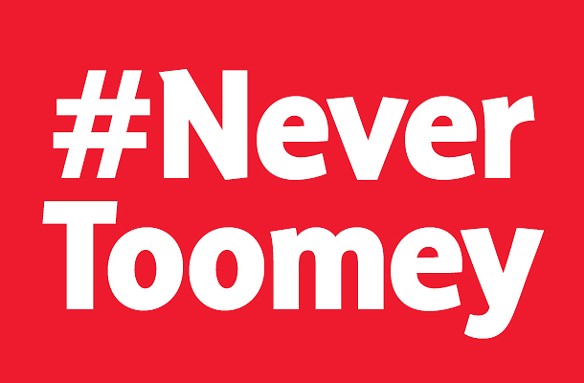We’ve all seen the incredibly popular hashtags on Twitter, hand-made posters and billboards this political season: #NeverTrump and #NeverHillary. When critics of either nominee post something on social media, these two phrases almost always accompany them. For the most part, they make sense. Voters are making a statement against Republican presidential nominee Donald Trump or Democratic presidential nominee Hillary Clinton ever becoming president.
And given the popularity of these hashtags, they have morphed and been applied to other races on the political ladder, including Pennsylvania’s U.S. Senate race. Tweets criticizing the campaign of Sen. Pat Toomey (R-Pa.) sometimes have an attached “#NeverToomey” hashtag.
But, Toomey is an incumbent and has been one of the state’s senators for about six years; “never” doesn't really apply. And this phenomenon is not unique to Toomey; #NeverRubio, #NeverAyotte and even #NeverMcCain have been used to reference races involving incumbent senators Marco Rubio (R-Fla.), Kelly Ayotte (R-N.H.) and John McCain (R-Ariz.). (McCain’s hashtag is the oddest, given he has served as Arizona’s senator for almost 20 years and rose to national prominence when he ran for president in 2008.) Maybe it should be #NeverAgain or #Foolmeonceshameonyoufoolmetwiceshameonme.
Even so, these “never” hashtags seem to be growing in popularity among senate races. There have been more than a dozen uses of #NeverToomey and more than 100 uses of #NeverMcCain this month on Twitter. But why, given that these hashtags are logically inaccurate?
A study from the Pew Research Center hints at a possible answer: Social media is the most effective online tool to inform potential voters. According to the study, 24 percent of adults look at social media to find out new information on the campaigns of Clinton and Trump. Only 10 and 9 percent look to campaign websites and emails, respectively.
The “never” hashtags for senate races involving incumbents also overwhelmingly apply to Republicans. Among battleground states, the only incumbent Democrat facing re-election is Michael Bennet of Colorado. As of Aug. 26, there have only been three instances of #NeverBennet on Twitter compared to the thousands that have been applied to Republican incumbent senators in battleground states.
Another Pew study offers a possible explanation for this partisan disparity. During this year’s primary elections, millennial voters in the Democratic party found news about candidates via social media 74 percent of the time. For their young Republican counterparts, it was only 50 percent of the time.
For the Pennsylvania senate race, #NeverToomey has been used about 50 times on Twitter, compared to #NeverMcGinty only twice, for Toomey’s Democratic opponent Katie McGinty.
And the strategy may be working. According to rollcall.com, a couple of senate races have shifted in favor of the Democrats, including Pennsylvania's. And the report currently indicates Democrats will regain the seats necessary to gain a majority in the Senate come 2017.
Regardless, applying logic to the #Never movement may be a fool’s game. The hashtag #NeverObama has thousands of appearances on Twitter and Facebook. The 22nd Amendment of the Constitution bars President Barack Obama from running for president again. Obama could potentially run for a U.S. House or Senate seat, but a president hasn’t successfully done this since Andrew Johnson became a Tennessee senator is 1874 (15 years after Johnson’s impeachment, oddly).
So congratulations to the Obama haters, come Jan. 20, 2017, #NeverObama will become a reality.


